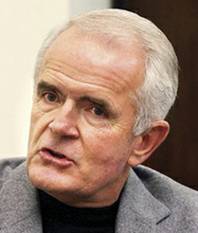Thursday, Aug. 27, 2009 | 2 a.m.

Gov. Jim Gibbons
Sun Archives
Sun Coverage
Beyond the Sun
- Office of Energy
- The Salt Lake Tribune: Firm seeks OK for petro pipeline near Great Salt Lake (7-14-2009)
- KSL.com: City weighs pipeline near airport open space (7-14-2009)
Nevada’s Energy Office recently reported that a planned gasoline pipeline connecting Las Vegas to refineries in Utah would lower prices at Southern Nevada pumps.
Too bad it’s probably not true.
The report came at the behest of Gov. Jim Gibbons. On June 26 he told his staff to find out how to “lessen the burden high gas prices are placing on Nevada residents and reduce the impact higher gas prices are having on tourism.”
The written answer from Hattice Gecol, Gibbons’ energy and science adviser and director of the state Energy Office, was, first, that the surest way to lower gas prices is to reduce fuel taxes. She was right about that, but with the state desperate for every penny of revenue it can get, taxes aren’t being cut.
Her report goes on to state that a gasoline pipeline into Southern Nevada from Utah would “almost certainly reduce the costs of fuel at the gas stations.”
She advised the governor to ask Nevada’s congressional delegation to pressure the Utah office of the Bureau of Land Management to speed up the permitting process for a planned gasoline and jet fuel line proposed by petroleum refiners Holly Corp., based in Dallas, and Salt Lake City-based Sinclair, which also has its own gas stations.
Right now Southern Nevada has only one gasoline and jet fuel pipeline. It brings in fuel from refineries in Southern California.
This new one will open access to five refineries in the Salt Lake City area, giving Nevada gas stations and McCarran International Airport more purchasing choice.
But the Utah pipeline won’t necessarily lower Southern Nevada gasoline prices, Western States Petroleum Association President Joe Sparano said.
Clark County's high gas prices aren’t generally caused by the problems the new pipeline could solve.
Barring refinery shutdowns or a breakage on the California pipeline, the same factors that make the price of gasoline from California rise would affect prices of gasoline from Utah. That’s because gasoline prices aren’t set by refineries competing for gas station customers. Wholesale prices are set at the distribution site and reflect the local market, not the cost of refining. They are based largely on the cost of unrefined crude oil and taxes. In most states those two factors make up 70 percent to 80 percent of the wholesale price, Sparano said.
In Nevada those taxes pack quite the wallop, more than those in neighboring states except California. Nevada adds 33.1 cents per gallon in taxes to the 18.4 cents in taxes the feds levy. The combination results in a tax charge of more than $9 when filling an 18-gallon tank. Retail prices, the ones you see at the pump, also are influenced by market forces such as supply and demand, the wholesale cost, anticipated prices for the next delivery and what the station across the street is charging.
“The investment by these companies, this pipeline, should bring supply in,” Sparano said, “but just having more supply in and of itself would not drive prices down.”
In her report, Gibbons’ energy czar said buying from Utah will also be cheaper because Utah does not require gasoline sold in its state to be refined to the high standards California does. She calls it a “lower-cost fuel supply.”
California has among the strictest air pollution laws in the nation and requires that gasoline sold in the state go through higher levels of refining. It costs 5 to 15 cents more per gallon to produce than the gasoline refined in other states, Sparano said.
But just because it costs more to make it, doesn’t mean the refiner will recover that cost. Again it comes down to the market price. The gasoline Southern Nevada will get from Utah would likely be about the same price as the gasoline from California, Sparano said.
What’s more, we’re not necessarily getting the same gasoline that California stations get. Refineries in California are only restricted from selling less-refined gasoline in California — not in other states, Sparano said.
“The quality of that gasoline you get is determined by Nevada, not California,” he said. “If I’m a California refiner, I produce what Nevada asks for.”
Gecol could not be reached for comment.
By the time her report was released in mid-July, construction on parts of the Utah pipeline project was under way. Today the Utah terminals have been completed and the Las Vegas terminal is half done, Holly’s president, Jim Townsend, said.
Within a couple of months Townsend expects to receive federal agencies’ final approval to build the pipeline. Construction crews are standing by and the pipeline should be operational by fall 2010, he said.
Holly’s UNEV pipeline is actually one of two proposed pipelines expected to be built for the Las Vegas market in the next few years. The other, the CALNEV pipeline, would run from San Bernardino County, Calif., to Las Vegas.

Join the Discussion:
Check this out for a full explanation of our conversion to the LiveFyre commenting system and instructions on how to sign up for an account.
Full comments policy